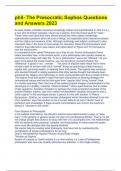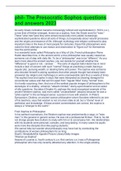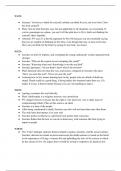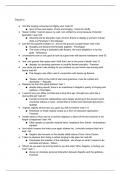Plato symposium Study guides, Class notes & Summaries
Looking for the best study guides, study notes and summaries about Plato symposium? On this page you'll find 27 study documents about Plato symposium.
Page 2 out of 27 results
Sort by

-
Summery - Plato on Love, Desire & Homoeroticism
- Summary • 5 pages • 2023
-
- $5.22
- + learn more
Cheat sheet for Plato's ideals on love (including desire and homoeroticism) with a focus on his symposium which includes the ideas of Pausanias, Aristophanes, Agathon, Socrates/Diotima and Pheadrus. It also covers the tripartite soul, the forms, controlling and resisting desire and Plato's republic .

-
Symposium Discussion
- Other • 1 pages • 2023
-
- $16.39
- + learn more
In the ancient Greece of Socrates, Plato, and Aristotle, a “symposium” was a banquet held after a meal, an “after-party” of sorts that usually included drinking, dancing, recitals, and engaging conversations on the topics of the day. For our purposes in this course, the Symposium discussions will not involve dancing, recitals, or a banquet, but they will provide food for thought on current ethical issues and direct application of the ethical theory discussed in each of these weeks. Fo...

-
Aristotle's philosophy Summary - PHI 208 Ethics and Moral Reasoning
- Summary • 2 pages • 2023
-
- $20.99
- + learn more
In the ancient Greece of Socrates, Plato, and Aristotle, a “symposium” was a banquet held after a meal, an “after-party” of sorts that usually included drinking, dancing, recitals, and engaging conversations on the topics of the day. For our purposes in this course, the Symposium discussions will not involve dancing, recitals, or a banquet, but they will provide food for thought on current ethical issues and direct application of the ethical theory discussed in each of these weeks. Fo...

-
Summary - PHI 208 Ethics and Moral Reasoning
- Summary • 3 pages • 2023
-
- $10.99
- + learn more
e How Should One Live? An Introduction to Ethics and Moral Reasoning, and Chapter 2 of John Stuart Mill’s Utilitarianism . You should also read or view the resource your instructor has supplied for this discussion, which you will find in the instructor’s discussion prompt. In the ancient Greece of Socrates, Plato, and Aristotle, a “symposium” was a banquet held after a meal, an “after-party” of sorts that usually included drinking, dancing, recitals, and engaging conversations on ...
Providing an in-depth description of notes from Plato, Phil 161A.

-
HUM EXAM top Questions and answers, 100% Accurate, rated A
- Exam (elaborations) • 5 pages • 2023
- Available in package deal
-
- $8.49
- + learn more
HUM EXAM top Questions and answers, 100% Accurate, rated A Genre of The Instructions of Amenemope - didactic (intended to teach) How does Utanapishtim test Gilgamesh? - stay awake What form does an answer in Ifa divination take? - a poem Highest good for Epicureans - pleasure first noble truth of buddhism - all is dukkha what does Krishna tell Arjuna that he must do? - fight! where were the Jews taken in exile? - Babylon who destroyed the 2nd temple in Jerusalem? - Ro...
Essay points with quotes and context for the three writes, plus critic's quotes

-
phil- The Presocratic Sophos Questions and Answers 2023
- Exam (elaborations) • 13 pages • 2023
- Available in package deal
-
- $18.49
- + learn more
phil- The Presocratic Sophos Questions and Answers 2023 As early Greek civilization became increasingly refined and sophisticated (c. 500 b.c.e.), a new kind of thinker emerged, known as a sophos, from the Greek word for "wise." These "wise men"(and they were almost exclusively men) asked increasingly sophisticated questions about all sorts of things, but especially about natural processes and the origins and essence of life. Although mythology and religion continued to play important roles...

-
Understanding of Virtue Theory Discussion Forum 2
- Other • 2 pages • 2023
-
- $15.99
- + learn more
You must post a minimum of three separate posts: a primary post that addresses all elements of the discussion prompt and two reply posts. Your main post must answer all the questions in the prompt and show evidence of having read the resources that are required to complete the discussion properly (such as by using quotes, referring to specific points made in the text, etc.). All posts (including replies to peers) are expected to be thought-out; proofread for mechanical, grammatical, and spelli...

-
phil- The Presocratic Sophos questions and answers 2023
- Exam (elaborations) • 13 pages • 2023
- Available in package deal
-
- $19.49
- + learn more
phil- The Presocratic Sophos questions and answers 2023 As early Greek civilization became increasingly refined and sophisticated (c. 500 b.c.e.), a new kind of thinker emerged, known as a sophos, from the Greek word for "wise." These "wise men"(and they were almost exclusively men) asked increasingly sophisticated questions about all sorts of things, but especially about natural processes and the origins and essence of life. Although mythology and religion continued to play important roles...





